First, let's deal with the real issue. I don't believe in abuse or in beatings. I do believe that your child must know that you mean business. And before they have a command of the language - you have to find a way to communicate so they will develop a "healthy" fear of consequences.
You must be in control as a parent of a toddler - or you will lose control from the toddler through teen years. Part of training a child and helping them to understand the world around them is to show them the end result of consequences. And unfortunately for busy, non communicative minds, that often means going nose to nose and letting them know you are upset with their actions. If you always present consequences for actions in sweet tones and lovely sweet lectures - your child will not be able to tolerate the angry tones of a school principle or a policeman.
Bad behavior must be accompanied by a heavy dose of disapproval or it will be repeated. But how do you reprimand without abuse?
1. Make the punishment fit the crime.
2. Allow your child to see your frustration and pain.
3. Get their attention. Maybe it's with the "one pop" method. That's when you hold one arm and "pop" their behind. Or...you can hold both arms and get in their face to demand that the action not be repeated. Or...call their name loudly and insist that the action stop. Or...pick him/her up and sit them firmly in your lap, holding them still until the action is stopped.
Once you have their attention by the above methods, then you must explain what they did wrong, what is expected of them next time and end with a hug and the reaffirmation that you love them.
On AOL today there was an article with the headline "Spanking harms toddlers"
The article stated, "Children who are spanked at age 1 are more likely to have behavior problems by the time they turn 2, according to a new study.
"Almost all the studies point to negative effects of spanking," said Elizabeth Gershoff, an associate professor on human behavior and family sciences at the University of Texas at Austin.
"Age 1 is a key time for establishing the quality of the parenting and the relationship between parent and the child," said study author Lisa J. Berlin, of the Center for Child and Family Policy at Duke University. "Spanking at age 1 reflects a negative dynamic, and increases children's aggression at age 2."
The research, which appears in the September/October issue of the journal Child Development, focused on 2,500 children from low-income families. It found that children who were spanked at 1 were more likely to show aggressive behavior at age 2 and performed more poorly on tests of their thinking abilities at age 3.
Elizabeth Gershoff, an associate professor on human behavior and family sciences at the University of Texas at Austin, told Health Day that the findings are just the latest that show spanking isn't good for children.
"Almost all the studies point to negative effects of spanking," she said. "It makes kids more aggressive, more likely to be delinquent and to have mental health problems."
Really?
Let's take a look at this research. First of all it was done on children from low-income families. Most low income families are not concerned with helping their children. Could there be other factors that these researchers are missing? Low income families are not known for self-esteem. Could that be where the aggression is coming from? Could it be that they work more and have their children in "rougher" low-income daycare? Perhaps the aggression comes from not enough holding, loving, or listening to calm soothing music. Maybe the aggression comes from too much rap and not enough Beethoven. Maybe the aggression comes from not enough healthy food or proper clothes or proper hygiene or proper vitamins or.... Maybe the children born to low income families hear their parents argue or have a sense that they are not safe.
Here's my point.....
Be very careful about these types of studies. Unless every thing in the study can be controlled - the outcome isn't totally true. The researcher can skew the results to say whatever she feels. Only if the "study" can be totally controlled can you say with 100% assurance that it is 100% accurate.
I've known hundreds of families that "one pop" their children and they are some of the best, non-aggressive, kindest, most loving and intelligent children out there. Don't be afraid to "PARENT" your child. Be calm, kind and careful to think through discipline. And if you need an honest look at good discipline - buy my book. Discipline Exposed, surviving fried worms and flying mudballs.
Seeking His Wisdom,
Debbie

